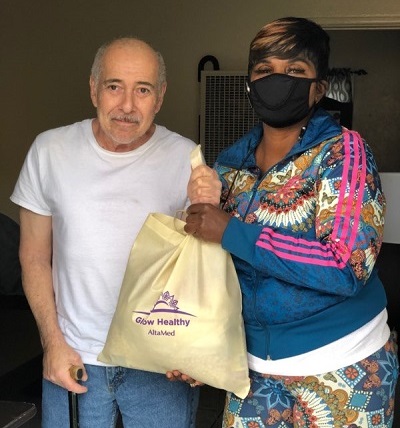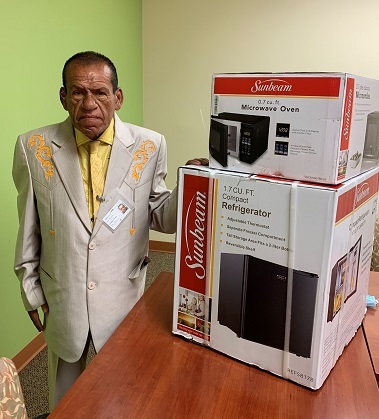Food insecurities goes beyond affording healthy meals
Food is a contentious topic – especially in the United States, where it is widely believed that there is an abundance of food, and that obesity and other chronic diseases are caused by an excess of food rather than by food insecurities.
Today, we are facing multiple public health crises – and it is only exacerbated by the pandemic. Millions of people in our communities are struggling to access basic necessities to live healthy- including access to quality physicians, medications and nutritious food, but what does this all mean? Health, society and economics are all interconnected. This has been made evident the past few years and we are still battling serious food shortages caused by lack of affordable produce, transportation disruptions, supply chain issues and a lack of essential workers. The intricacies of food insecurity must be understood in order to mitigate this barrier in our communities and Southern California.


In January alone, over 1 million residents in Southern California faced food insecurity. This leaves our patients vulnerable to devastating health consequences – putting them at risk of developing diet-related chronic illnesses such as high blood pressure, obesity, type 2 diabetes, heart disease, stroke and cancer.
“We see first-hand how social determinants of health – such as not enough fresh food – impact a person’s ability to maintain positive health outcomes. Many of us take these social determinants for granted, like a kitchen in our homes or a refrigerator to store medication”, says Dr. Shapiro “If you are one of the thousands in Southern California who experience food insecurity, there is an added challenge when it comes to taking care of you and your family’s health. No person should have to face the devastation that our community faces due to a lack of resources and support.”
Food insecurity manifests itself in many ways and goes beyond the well-known stereotype of not having food. It is much more complex. Aside from not being able to afford nutritious foods food insecurity can include:
• Living in a food desert or in urban area where it is difficult to purchase good quality, affordable food. There may only be fast food chains in your community that is the only access to food in your area.
• Insufficient kitchen space and or kitchen appliances
• Lack of transportation (to and from the supermarkets)
• Homelessness
Many of our patients struggling with food insecurity are the same essential workers who kept our nation running during the pandemic, and continue to do so. Those who couldn’t afford to stay home or quit their jobs were forced to work, often, in dangerous conditions to prepare food, deliver orders or tend to the sick. These forgotten heroes, the people who took care of us when we needed them the most, are some of the most at-risk. Today, it’s time for us to take care of them and minimize their healthcare barriers.
Direct Relief Fund
Social factors play a huge role in the development and stability of your health. Health is not determined by genetics alone. Things like your neighborhood, zip code, economic stability, education level and racial discrimination can all affect health.
Many of these external contributors are out of our patients hands like job loss, homelessness and unsteady income negatively impact our community members’ ability to access affordable, nutritious foods worsening their ability to take control of their health.
That’s why in 2017, AltaMed began distributing additional funds and immediate assistance to our patients through our Direct Relief Fund. Through this fund, we have been able to give families quick aid during extremely challenging situations. Providing reassurance and temporary relief is a small gesture of support we offer to our patients so they can focus on improving their health. What does direct relief look like? The top three most funded requests are grocery store gift cards, transportation vouchers and basic household necessities. Our Direct Relief Program cannot continue without your support.
A True Story

Enrique is a longtime patient of AltaMed. Before the pandemic, his diabetes was under control, however after skipping appointments due to fear of COVID-19, his chronic condition worsened. Our PACE Downey team discovered that Enrique had no means to access, store or prepare healthy foods to feed himself. Instead, Enrique frequented his local convenience store and purchased unhealthy foods he could get for cheap. This perfect storm triggered Enrique’s A1C to soar into unhealthy blood sugar levels. The need for a designated refrigerator became more crucial as his (diabetes) diagnosis would soon require insulin.
Yuliam Belloso, LVN and Home Care Coordinator, and the PACE Downey Team recommended that Enrique obtain a mini-fridge to store healthier food choices and insulin, as well as a small microwave for cooking. After Yuliam submitted a request on his behalf, Enrique was provided with the means to purchase both appliances.
Thanks to the diligence of our employee, Yuliam and the generosity of our donors, Enrique has been able to get his chronic disease under control.
What You Can Do
The Direct Relief Fund is an action-oriented way to keep your community members healthy and safe. These members took care of us during the pandemic and now they struggle with the negative effects of food insecurity and other social determinants of health. Click here to make an instant impact in your community.
To learn more about social determinants of health and what we are doing to ensure our communities grow healthy, follow us at @altamedhealths on Instagram and Facebook, and sign up for our newsletter here.
Help us deliver a better tomorrow for our communities
All contributions are tax deductible to the extent allowed by law.
Our Tax ID number is: 95-2810095.
© 2020 AltaMed Foundation – All Rights Reserved
